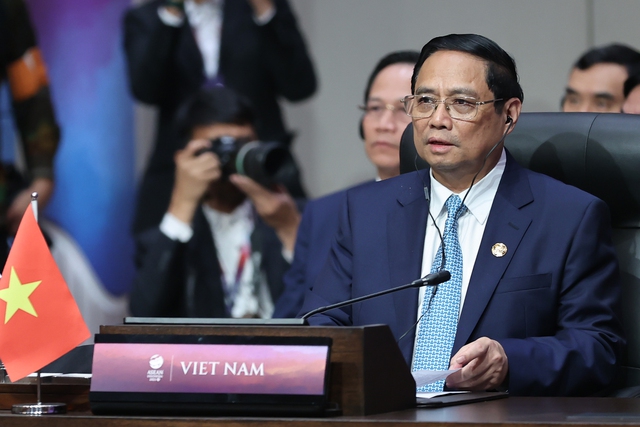Gov’t chief attends ASEAN-UN Summit
VGP - Prime Minister Pham Minh Chinh expressed his hope that the ASEAN-UN comprehensive partnership would truly become a flagship in strengthening international unity, persistent multilateral cooperation, ensuring sustainable peace and security, and promoting prosperity and sustainability worldwide.

Prime Minister Pham Minh Chinh at the the ASEAN-United Nations Summits, Jakarta, Indonesia, September 7, 2023 - Photo: VGP/Nhat Bac
Prime Minister Pham made the above statement at the ASEAN-United Nations Summit in Jakarta, Indonesia, on September 7.
To such end, Pham highlighted the need for active coordination in implementing the ASEAN Community Vision 2025 and the 2030 UN Agenda for Sustainable Development.
He suggested that the UN should pay special attention to and support Viet Nam and Mekong River basin countries in sustainable management and water resource usage, improving the capacity to deal with climate change and sea-level rise, particularly in the Mekong Delta region of Viet Nam.
He also asked the UN to back Viet Nam in the successful implementation of the Just Energy Transition Partnership (JETP), as well as its efforts in transitioning to a green and circular economy.
The Vietnamese leader hoped that the UN would continue supporting ASEAN's central role in the region, work closely with ASEAN to promote values toward peace, enhance dialogue and cooperation, build trust, and establish standards of conduct among nations in accordance with the rule of law.
As an active and proactive member of both ASEAN and the UN, Viet Nam will spare no effort to contribute to the common work of the UN, affirmed Prime Minister Pham.
Viet Nam is committed to strengthening its participation in peacekeeping operations and fulfilling international responsibilities, including its role as a member of the UN Human Rights Council for the 2023-2025 tenure, for sustainable development and prosperity of all countries, regions, and the entire world, he said.
The Prime Minister also reiterated ASEAN’s common stance on the East Sea, and calling on partners to support the full and effective implementation of the Declaration on the Conduct of Parties in the East Sea (DOC) and the formulation of a legally binding, effective and substantive Code of Conduct in the East Sea (COC) in accordance with international law, including the 1982 United Nations Convention on the Law of the Sea (UNCLOS), contributing to turning the East Sea into the sea of peace, stability, cooperation and sustainable development./.

